
Understanding white label SEO pricing is one of the biggest levers you can pull for your agency’s growth. In short, white label SEO pricing refers to the costs agencies pay for third-party fulfillment of SEO services, with typical monthly retainers ranging from $300 for basic local campaigns to over $2,500 for more competitive strategies. It’s not just about finding the cheapest provider; it’s about understanding what you’re paying for, how it impacts your profitability, and how it enables you to scale without the usual growing pains. The right partnership can transform your agency from a bottlenecked service provider into a lean, scalable growth machine. This guide breaks down the different models, hidden costs, and strategic considerations to help you choose a partner that fuels your success.
What Counts as White Label (vs. Regular SEO) from a Pricing Perspective
From a pricing perspective, the core difference between white label SEO and regular SEO is who manages the client relationship. Regular SEO services are client facing, meaning the price includes strategy calls, direct communication, and custom reporting built for that specific client.
White label SEO, on the other hand, is an anonymous, behind the scenes fulfillment service. Your agency owns the client relationship, and the white label provider executes the work under your brand. The pricing reflects this structure. You’re not paying for client management overhead. Instead, the cost is focused on deliverables like technical audits, content creation, link building, and branded reports that you can pass directly to your clients. This model allows you to offer expert level services without building a costly in house team.
Types of White Label SEO Pricing Solutions and Models
White label SEO pricing isn’t one size fits all. The costs are structured around the type and scope of work you need.
Common Service Structures
- Full Service Retainers: This is the most common model, where you pay a recurring monthly fee for a comprehensive SEO campaign. These packages often include on-page optimization, content creation, technical fixes, and link building. Basic retainers for small businesses might start around $300 to $700 per month, while more standard packages can range from $700 to $1,500 per client.
- Project Based Services: If you have a client who needs a one-time fix, like a comprehensive technical audit or a site migration plan, you can pay a flat fee for that specific project.
- A La Carte Services: Some providers allow you to purchase services individually. You might pay per blog post, per backlink, or for a batch of local citations. This offers flexibility but can be harder to manage at scale.
Pricing Models Explained: How Costs Scale as You Grow
The white label SEO pricing model you choose can dramatically affect your agency’s cash flow and profitability as you add more clients.
| Pricing Model | How It Works | Best For | Potential Downside |
|---|---|---|---|
| Flat Fee | A fixed, predictable monthly cost per client. | Agencies that need predictable expenses and simple budget forecasting. | Scope can be rigid; ensure the plan covers all your client’s needs. |
| Per Project | A one-time fee for a specific, defined deliverable. | One-off client requests or agencies just starting to test SEO services. | Can be less cost-effective for ongoing SEO needs. |
| Tiered Packages | Predefined packages (e.g., Basic, Pro, Elite) with different service inclusions at set prices. | Agencies serving clients of various sizes and needs. | The jump between tiers can be significant. |
| Custom Quote | Pricing is tailored to the specific needs and goals of each client. | Large or enterprise clients with complex requirements. | Can slow down the sales process; requires a new quote for every prospect. |
For most agencies, a flat fee model like the one offered by Rankai provides the best balance of predictability and value, making it easy to calculate your margins and scale your services.
Total Cost of Ownership (TCO) and Vendor Due Diligence
The monthly sticker price of a white label SEO service is only part of the story. The Total Cost of Ownership includes other factors that can impact your bottom line.
Hidden Costs and Factors to Vet
- Onboarding Fees: Does the provider charge a setup fee to get a new client started?
- Contract Length: Are you locked into a 6 or 12 month contract? A “cancel anytime” policy drastically reduces your risk.
- Reporting Tools: Is access to a professional reporting dashboard included, or is that an extra fee? Manual reporting can cost an agency $400 to $800 per client monthly in labor alone.
- Scope Creep: What happens if a client needs more work than the plan covers? Understand how the provider handles overages or plan upgrades.
When performing due diligence, look for transparent case studies, clear communication channels, and a proven track record.
When to Implement or Switch: Client Count Thresholds and ROI
Deciding when to use a white label provider is a critical strategic decision. It often makes sense when you hit a specific inflection point.
Key Triggers for Outsourcing
- Capacity Issues: Your current team is overworked, and quality is starting to slip. You can’t take on new clients without sacrificing results for existing ones.
- Profitability Squeeze: The cost of hiring, training, and retaining in house SEO talent is eating into your profit margins. Outsourcing can reduce operational costs by 30% to 70% compared to building an in house team.
- Service Gaps: Clients are asking for SEO, but you lack the expertise to deliver it confidently. Rather than referring them to a competitor, you can fulfill their needs under your own brand.
To calculate your ROI, use a simple formula: your monthly client retainer minus the white label provider’s fee. For a fuller framework on tracking outcomes, see how to tell if your SEO strategy is working. Successful agencies often mark up the white label cost by 100% (a 50% margin) to cover their own client management, sales, and overhead costs.
Choosing by Agency Type and Budget
The right white label SEO pricing and partner depends heavily on your agency’s size and the clients you serve.
For Startups and Freelancers
Budget is key. You need an affordable SEO service that can deliver results without locking you into a long-term contract. Look for providers with low cost entry plans (under $1,000/month) and pay as you go options. This allows you to offer SEO services and build case studies without taking on massive financial risk.
For Growing SMB Agencies
Your focus is on scalability and consistency. If scaling content operations is the goal, see our programmatic SEO guide. You need a partner who can handle five, ten, or fifty clients with the same level of quality and efficiency. A flat fee retainer model is ideal here, as it simplifies billing and forecasting. Services like Rankai are built for this exact scenario, offering high content velocity and iterative optimization at a predictable monthly cost.
For Large, Full Service Agencies
You may require more specialized or custom solutions. This could mean partnering with an enterprise level provider for complex clients or using multiple specialized white label vendors, one for technical SEO and another for high authority link building, for instance.
Top 10 White Label SEO Pricing Packages Compared
Now that you have a foundational understanding of what to look for in a white label SEO provider, it’s time to dive into the specifics. In this section, we’ll provide a detailed comparison of the pricing packages from ten of the leading white label SEO platforms. This head-to-head analysis will help you evaluate the features, scalability, and overall value each provider offers, making it easier to identify the best fit for your agency’s needs and budget.
1. SEOReseller
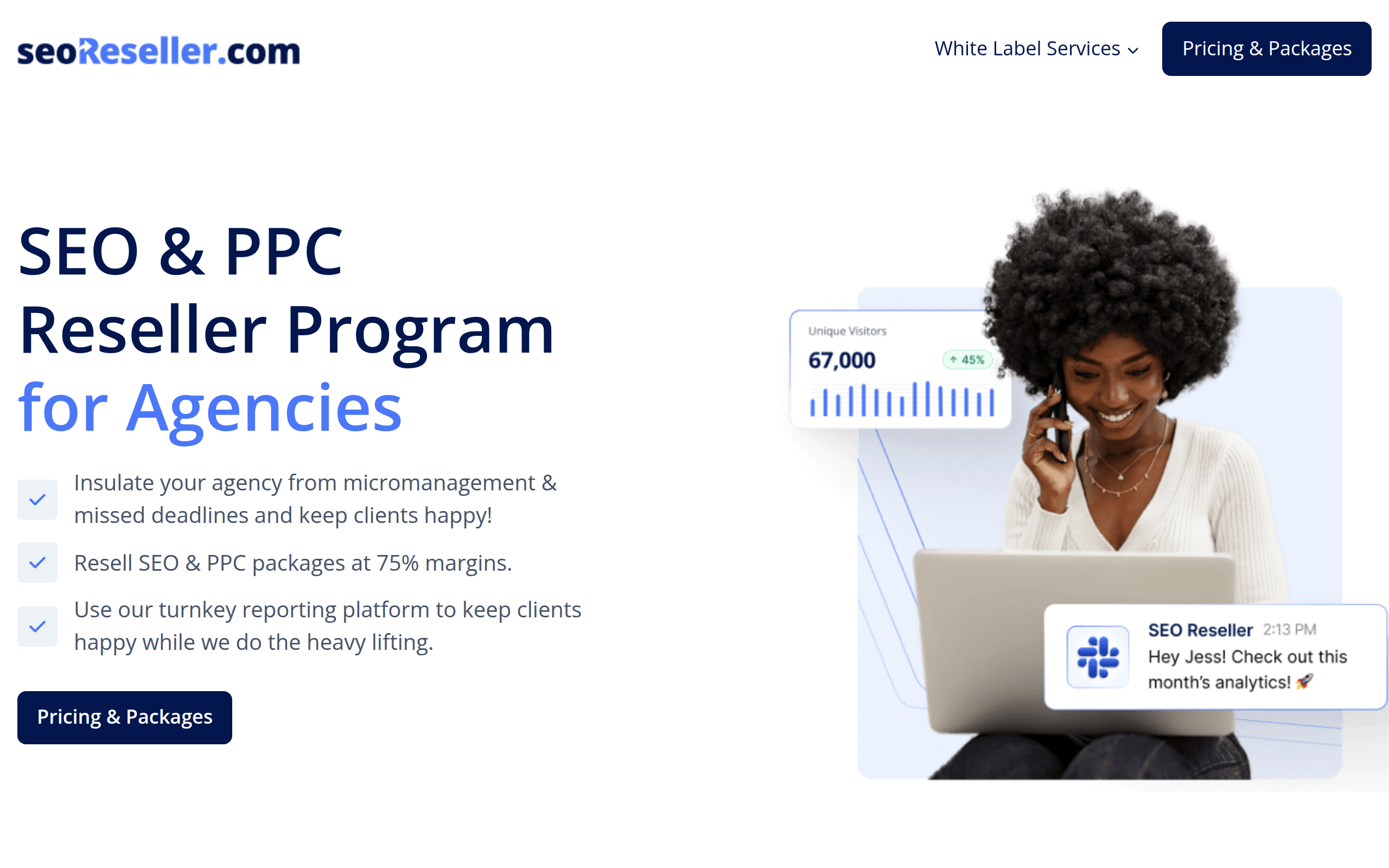
If you want white-label SEO that just ships, SEOReseller feels like the plug-and-play option: predictable deliverables, clean branding, and U.S. fulfillment that agencies can hand to clients without explaining a maze of tool settings.
Price & white-label at a glance: Plans start at $299/mo for GBP-only services, with full white-label access included across all tiers. L3 depth (full rebrand) puts realistic costs around $499-$699/mo per client before optional link add-ons.
Agency edge: Transparent per-client pricing plus an included branded portal shortens sales cycles and kickoff time. With USA-based fulfillment and 24/5 support, you get repeatable outcomes that help retain SMB clients.
- What you get:
- Full L3 white-labeling with a custom-domain client portal, branded reports, and client logins.
- Published, contract-free wholesale pricing for local and national SEO ($499-$699/mo).
- USA-based fulfillment covering technical SEO, content, and link building with 24/5 support.
- Integrations with GA, GSC, and GBP for unified reporting.
- Cross-sell add-ons for white-label PPC and social media management.
- Heads-up:
- Advanced sales tools (CRM, proposal builder) require a separate subscription.
- Costs rise with link add-ons (guest posts ~$59-$319 per link).
- A 30-day notice is required to fully terminate the partnership.
2. WebCEO
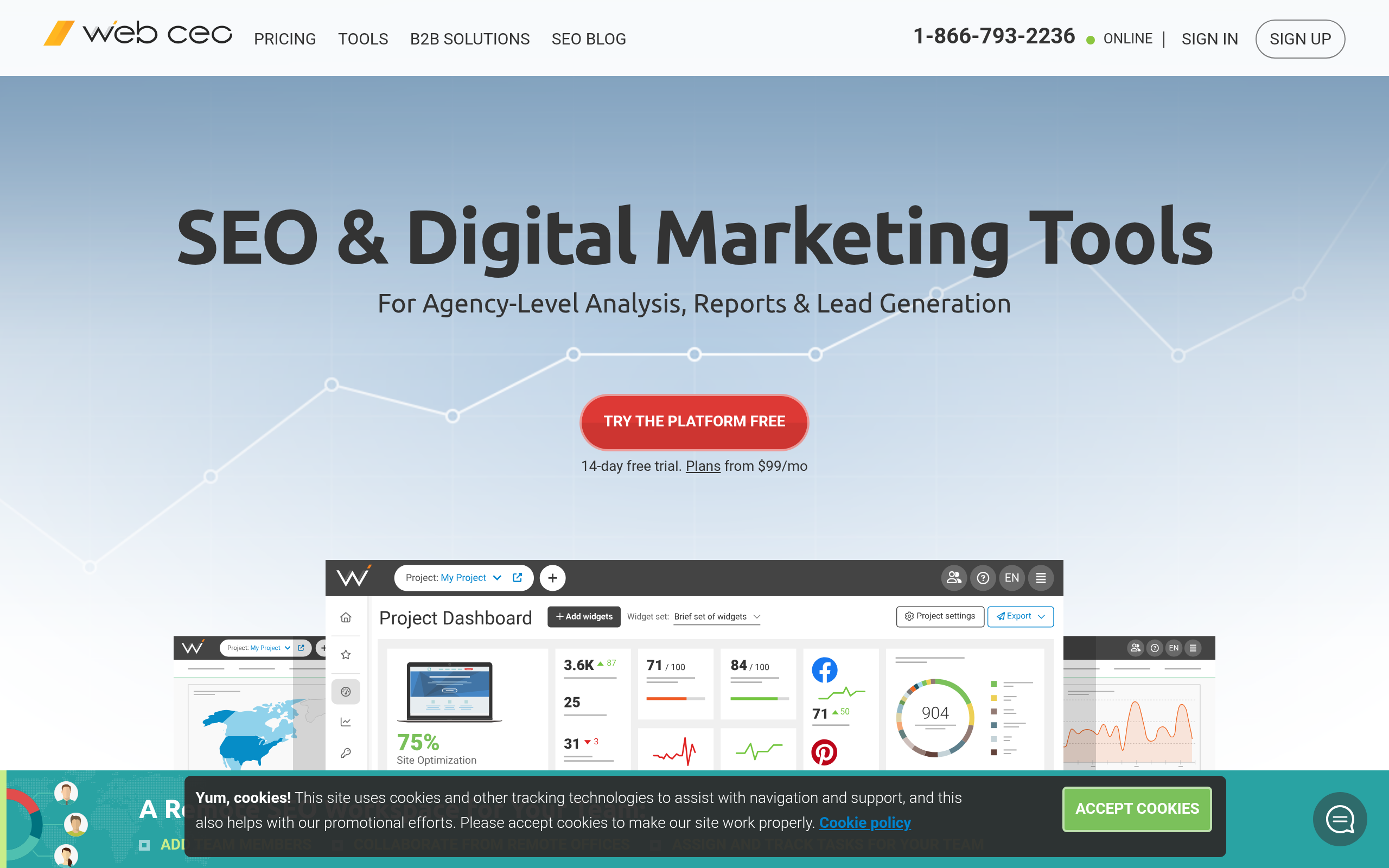
WebCEO gives agencies a branded portal that scales from a handful of clients to hundreds, with granular controls that let you match deliverables to budgets without losing your margin in over-scanning.
Price & white-label at a glance: Agency Unlimited starts at $99/mo; full L3 on your own domain requires a $40/mo add-on. Expect roughly $339/mo in realistic costs once you factor projects and rank-tracking usage.
Agency edge: Put the portal on your domain, set user roles and scan caps, and decide whether to absorb or pass through usage, so you can keep margins intact while giving clients real-time visibility.
- What you get:
- Full L3 white-labeling with custom domain, logo, colors, header, and footer.
- Multi-user controls, read-only client access, and per-user scan limits.
- Unlimited scheduled reporting and automated scans across 90+ report types.
- Native GA4, GSC, GBP integrations plus a full-function API.
- Unlimited projects and a site lead-gen widget.
- Heads-up:
- White-label portal is gated to the highest tier and requires the $40/mo add-on.
- Variable costs for ranks/projects/users can spike without governance.
- No built-in billing, so bring your own payments.
3. AgencyAnalytics
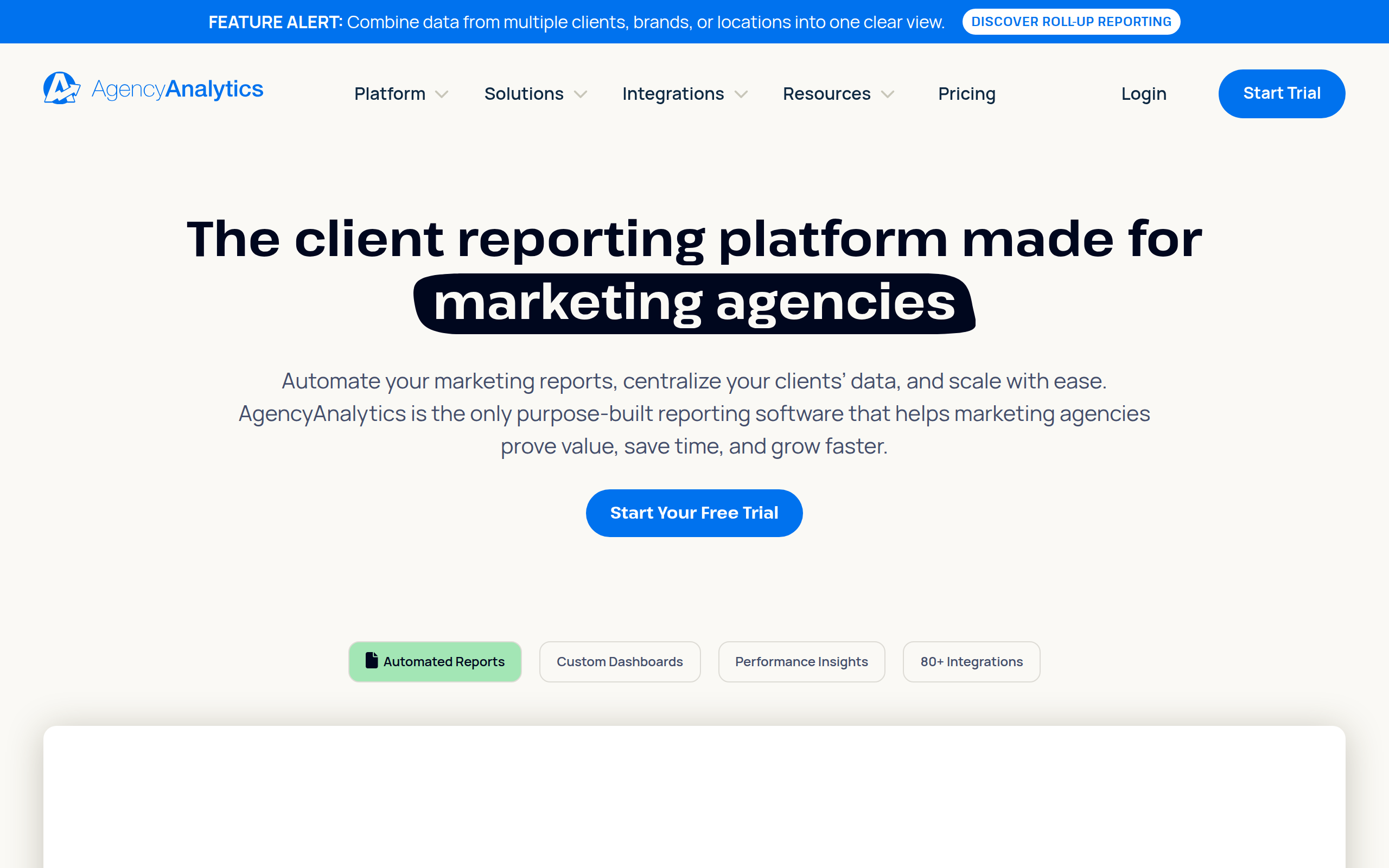
This is the “reporting done in an afternoon” platform: connect, brand, and roll out dashboards your clients will actually read, without nickel-and-diming you on seats.
Price & white-label at a glance: Starts at $59/mo, but full L3 with custom domains requires the Agency plan at $179/mo. For ~10 clients with rank tracking, the realistic monthly cost lands around $262/mo (annual billing).
Agency edge: Unlimited client logins and automated reports mean you spend less time compiling data and more time acting on it, boosting retention and freeing your team from weekly reporting sprints.
- What you get:
- Full L3 white-labeling with custom domains, logos, colors, and branded emails (Agency tier+).
- Unlimited, schedulable reports with AI summaries and portfolio roll-ups.
- 80+ integrations with tiered connection limits per client.
- Unlimited staff users on Agency and simple per-client pricing as you grow.
- Heads-up:
- Freelancer tier lacks custom domains and limits integrations.
- Rank tracking is a paid add-on billed per 500 keywords.
- API and forecasting require Agency Pro.
4. BrightLocal
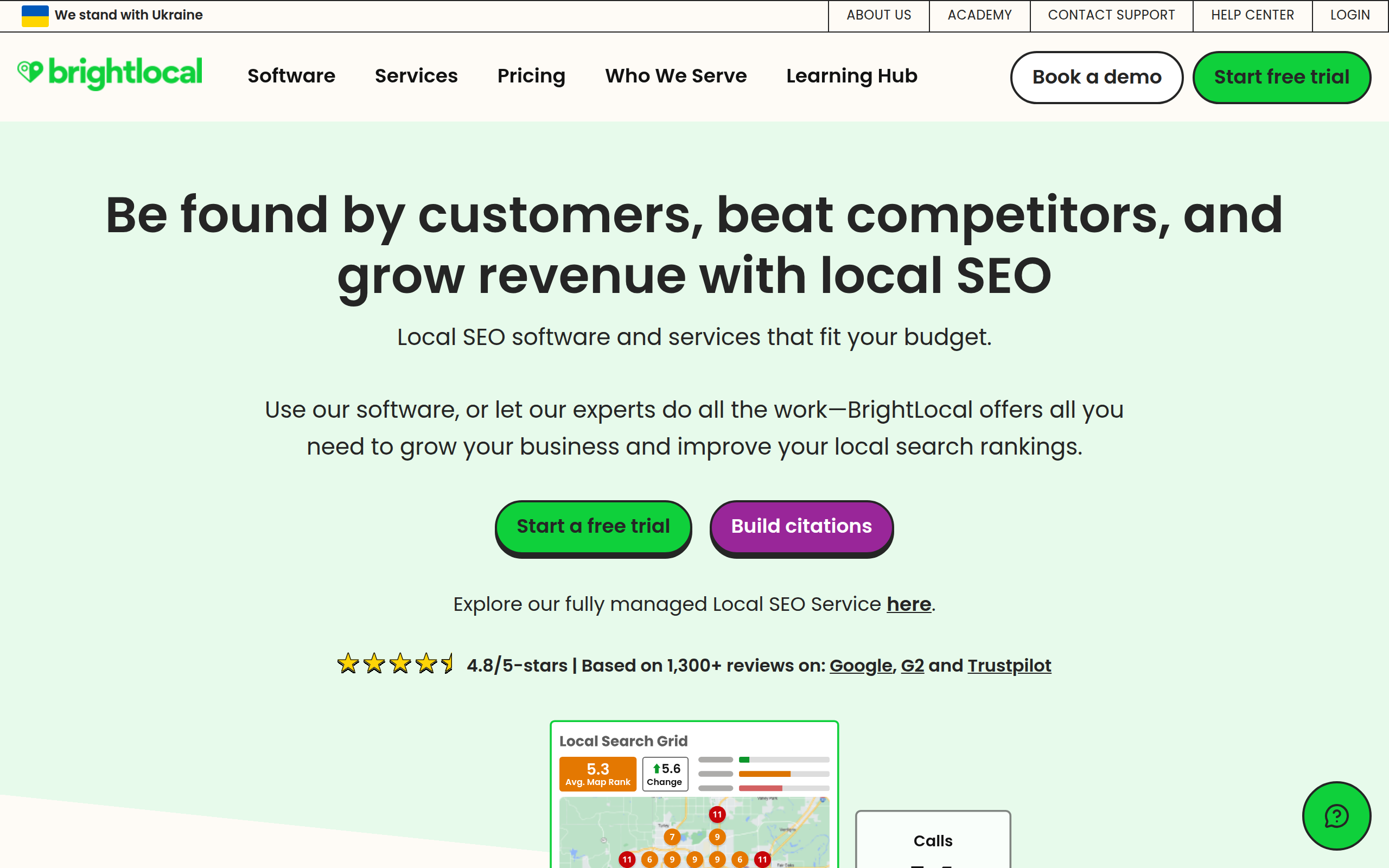
For local SEO, BrightLocal hits the sweet spot: a clean, client-friendly dashboard, unlimited users, and PAYG citations so you can scale locations without committing to bloated retainers.
Price & white-label at a glance: Plans start at $39/mo with L2 white-label (branded reports and client dashboard) on all tiers. Managing ~10 locations typically runs about $169/mo with common add-ons.
Agency edge: The unlimited user model and automated dashboards cut reporting time, while Citation Builder’s PAYG model delivers quick wins without locking you into costly, long-term listing contracts.
- What you get:
- Branding via custom domain, logo, and SMTP for client-facing dashboards.
- Automated PDF/online reports with configurable modules per location.
- Integrations for GBP, Facebook, and local data sources, plus a GBP Post Scheduler.
- Unlimited users; pricing scales by number of locations.
- Email/chat support and a 14-day free trial.
- Heads-up:
- Reputation Manager and listings sync are gated to higher tiers.
- Yelp integration, larger Local Search Grids, and extra report runs add usage fees.
- Monthly plans don’t include manual citations or aggregator submissions (PAYG only).
5. SE Ranking

SE Ranking blends an all-in-one SEO toolkit with a real client portal, making it a strong value play when you want end-to-end execution plus branding under your own URL.
Price & white-label at a glance: From $95.20/mo (Pro annual). Full L3 requires the Agency Pack (+$50/mo), putting a fully rebranded custom-domain portal at roughly $145/mo.
Agency edge: The Agency Pack’s portal, unlimited scheduled reporting, and built-in lead-gen widget consolidate your client experience, reducing tool sprawl while helping you capture and convert new business.
- What you get:
- L3 white-label via CNAME, branded login, and custom SMTP.
- Client portal with 10 client seats and permissioned sections.
- Unlimited automated report scheduling with the Agency Pack.
- Looker Studio integration and API on Pro/Business plans.
- Unlimited projects and higher keyword caps on Business.
- Heads-up:
- White-label is gated to the Agency Pack, which requires annual Pro/Business.
- Add-ons (Content/Local Marketing) and extra manager seats ($20/mo) can add up.
- Without Agency Pack, scheduled reporting limits pinch multi-client workflows.
6. Semrush
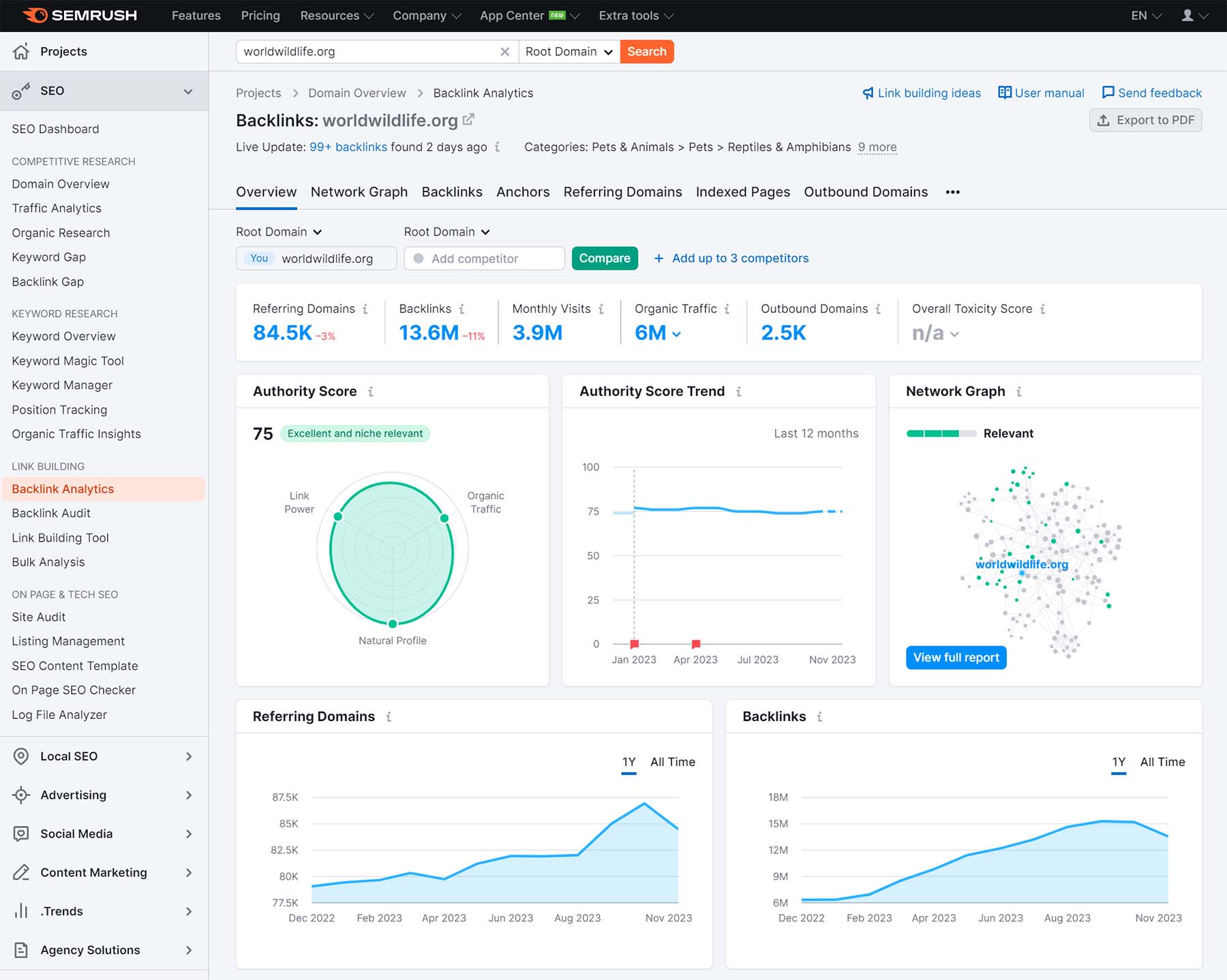
Semrush is the heavyweight toolkit many teams already know; with Pro reports, it becomes a swift way to package SEO insights in polished, branded deliverables, especially when clients want everything in one concise view.
Price & white-label at a glance: Guru is $249.95/mo; white-label requires My Reports Pro at $20 per report (L1). One user with ~5 client reports typically lands around $349.95/mo.
Agency edge: Drag-and-drop reporting pulls data from 35+ sources into a single narrative with AI summaries, so your team spends minutes, not hours, turning raw data into client-ready insights.
- What you get:
- Branding controls for logos, themes, custom sender domains, and scheduled delivery.
- Consolidate Semrush data with GA, GSC, and 35+ platforms in Pro reports.
- Looker Studio connectors on Guru/Business for extended dashboards.
- Add paid users with role-based access; share view-only links with clients.
- Heads-up:
- White-label is charged per report ($20/report), scaling costs with volume.
- The dedicated Client Portal is sunset; sharing is via links, not logins.
- Core plans include scheduled PDFs, but not fully white-labeled without Pro reports.
7. Serpstat
![]()
Serpstat is a cost-effective suite for teams that need solid rank tracking, audits, and research, plus branded reports, without investing in a full client portal.
Price & white-label at a glance: Plans run $50-$410/mo, with true white-label restricted to the Agency tier. That tier delivers L1 (branding, no Serpstat logos) and sets realistic costs at $410/mo for agencies that need it.
Agency edge: The report builder, templates, and scheduling streamline recurring updates, while the Agency plan’s bundled seats and priority support help larger teams move faster.
- What you get:
- Branding on Team plans; Agency removes Serpstat logos entirely.
- Drag-and-drop custom reports with scheduling and shareable links.
- Looker Studio and Google Sheets connectors; GA4 data in custom reports.
- Agency includes 30 team members and 50 scheduled reports.
- Priority chat and phone support on Agency.
- Heads-up:
- True white-label is locked to the top tier.
- No custom-domain client portal, as sharing is via Serpstat.com links.
- Usage caps apply; extra credits and special crawls cost more.
8. Swydo

Swydo is the lean, get-it-done reporter, ideal when you want branded dashboards and PDFs that scale with clients, not with your headcount.
Price & white-label at a glance: Starts at $49/mo with L1 white-labeling (fully branded reports/dashboards) included. For ~10 clients, expect around $119/mo based on data-source usage.
Agency edge: Unlimited users and built-in white-labeling (custom domain and email included) let you stand up client-ready reporting in hours while avoiding per-seat cost creep.
- What you get:
- Host dashboards on your custom domain, apply brand templates, and send from your email.
- Automate PDFs, live dashboards, templates, and password-protected share links.
- Native GA4, GSC, GBP, Semrush connectors plus Google Sheets.
- Unlimited users and reports with client-level access controls.
- Heads-up:
- L1 only, with no fully rebranded portal experience.
- Usage costs tied to data sources can grow with complex/multi-location clients.
- No built-in rank tracking or site audits; you’ll integrate other tools.
9. Whatagraph
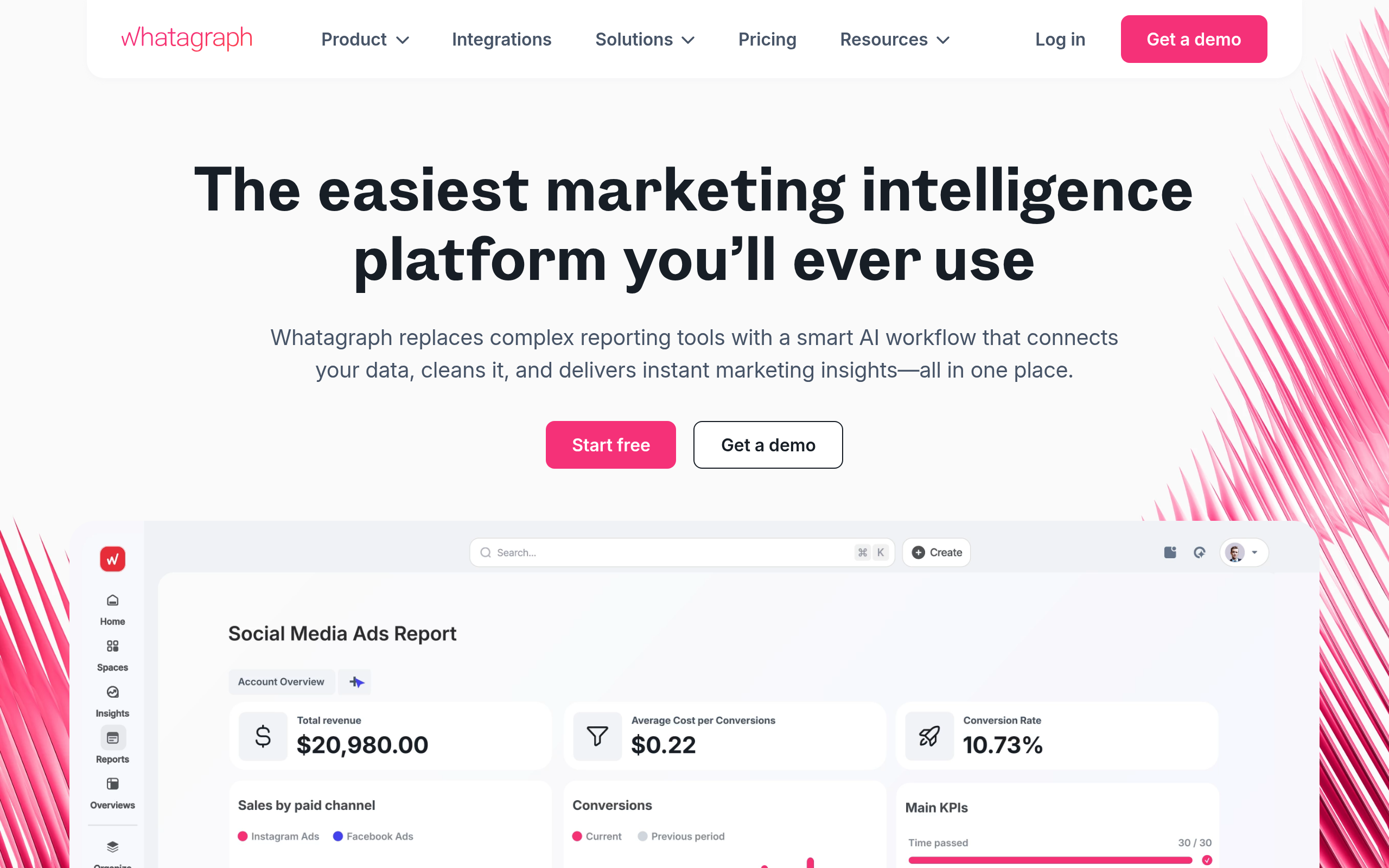
Whatagraph is a premium, cross-channel reporting layer that excels when your SEO stories need context, blending search, content, and paid data into client-friendly narratives on your domain.
Price & white-label at a glance: The Boost plan for agencies starts at $579/mo and includes full L3 white-labeling (custom domain, branding removal). Realistic starting costs hover around ~$600/mo, scaling with data-source credits.
Agency edge: Native SEO integrations, AI summaries, and automated dashboards slash weekly reporting hours, giving teams more time for strategy while presenting a polished, on-brand experience.
- What you get:
- Full L3 white-label: custom domain, sender emails, and complete branding removal.
- Direct connectors for Ahrefs, Semrush, and Google Search Console.
- Scheduled emails and password-protected live dashboards.
- Data blending for custom metrics and holistic cross-channel views.
- Unlimited users/reports; higher tiers add dedicated success.
- Heads-up:
- Full white-label and advanced SEO connectors sit on pricier tiers (Boost+).
- Credit-based pricing can scale up quickly with many sources.
- Client access relies on shared links, not individual portal logins.
10. DashThis

DashThis is the quick-launch dashboarder. Standardized templates, unlimited seats, and clean branding help you ship client-ready SEO reports in record time.
Price & white-label at a glance: Starts at $49/mo, but full L3 (custom domain + branded email + no DashThis logos) requires the Professional plan with 10 dashboards. Expect about $159/mo for agencies that need full rebrand.
Agency edge: Per-dashboard pricing with unlimited users lets you scale reporting across accounts without getting taxed per seat, which is great for fast-growing teams standardizing deliverables.
- What you get:
- Custom domain, branded sender, and complete branding removal.
- Scheduled emails, shareable links with optional passwords, and PDF exports.
- Integrations with GSC, Ahrefs, SEMrush, GA4, plus Google Sheets for custom data.
- Unlimited users, integrations, and data sources on every plan.
- Heads-up:
- Full white-label features start at 10 dashboards ($159/mo+).
- No authenticated client portal; access is via shareable links.
- Limited role granularity, as invited team members default to admin without SSO.
Multi Provider Strategies, Quality Control, and Risk Management
Using a single, all-in-one provider simplifies management, but a multi provider strategy can sometimes offer best in class results for specific tasks. For example, you might use a content focused provider for their publishing velocity and a separate niche agency for digital PR.
Regardless of your approach, quality control is non negotiable. Always establish a review process. Before sending any report or deliverable to a client, review it internally to ensure it meets your agency’s standards and aligns with the client’s goals.
To manage risk, prioritize partners with transparent, outcome focused reporting. Vague reports are a red flag. You need to see clear data on ranking improvements, traffic growth, and tasks completed. This transparency is crucial for both client retention and your peace of mind.
Bottom Line Recommendations and Negotiation Tips
Ultimately, the best white label SEO pricing is the one that allows you to deliver exceptional results for your clients while maintaining healthy profit margins for your agency. Healthy agency net profit margins often fall in the 11% to 21% range, so structure your pricing to support that goal.
Key Recommendations
- Prioritize Value Over Price: The cheapest option is rarely the best. A slightly more expensive provider that gets better results will lead to higher client retention and is worth the investment.
- Seek Flexibility: Avoid long-term contracts, especially when starting with a new partner. A “cancel anytime” policy shows the provider is confident in their ability to deliver.
- Vet the Process: Ask about their process for keyword research, content creation, and technical implementation. Do they have a clear, repeatable system?
When negotiating, ask about potential discounts for bringing on multiple clients at once or for paying quarterly instead of monthly.
Conclusion
Choosing a white label SEO partner is a decision that shapes your agency’s future. By looking beyond the surface level white label SEO pricing and evaluating the provider’s model, transparency, and scalability, you can build a reliable fulfillment engine. This frees you up to focus on your core strengths: building client relationships and growing your business. The right partnership empowers you to say “yes” to more clients, expand your service offerings, and build a more profitable, resilient agency.
Ready to see how an AI assisted, human guided SEO service can scale your agency? Explore Rankai’s flat fee program.
Frequently Asked Questions
What is a typical white label SEO pricing range?
White label SEO pricing can vary widely. Basic packages for small, local businesses often range from $300 to $800 per month. More comprehensive packages for competitive niches can cost $800 to $2,500 per month or more. The average monthly cost for general SEO services often falls between $1,000 and $2,500.
How do I price white label SEO services for my clients?
A common and effective strategy is the value based markup. A good rule of thumb is to charge your client roughly double the cost of the white label service. For example, if the white label provider charges you $500 per month, you would charge your end client $1,000 to $1,200. This 50 to 60 percent margin covers your client management, reporting, sales, and administrative costs while leaving a healthy profit.
Is white label SEO profitable?
Yes, it can be highly profitable. By outsourcing fulfillment, you eliminate the significant overhead of an in house team, including salaries, benefits, and expensive software subscriptions. This model allows you to maintain high profit margins while scaling your client base efficiently.
What’s the difference between white label SEO and a reseller program?
The main difference is branding. With white label SEO, the work is performed under your agency’s brand, and the client is never aware of the third party provider. In a reseller program, you are typically selling a known third party’s product or service, and your branding may or may not be the primary focus.
How does AI affect white label SEO pricing?
AI is making white label SEO more efficient and affordable. AI tools can accelerate tasks like keyword research, content drafting, and technical analysis, which allows providers to increase output and lower costs. It’s also reshaping visibility in search; see Google’s AI Overviews for what’s changing. A hybrid model, combining AI for speed with human experts for strategy and quality control, often provides the best value in today’s market.